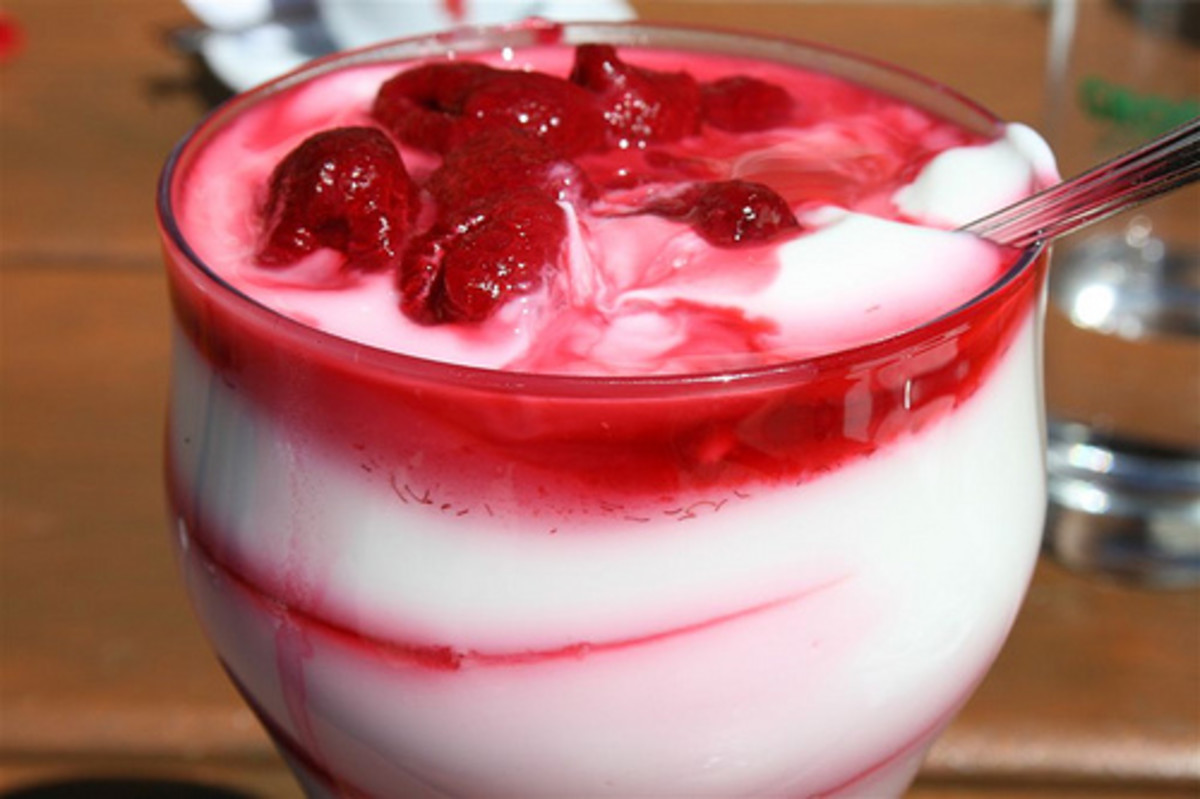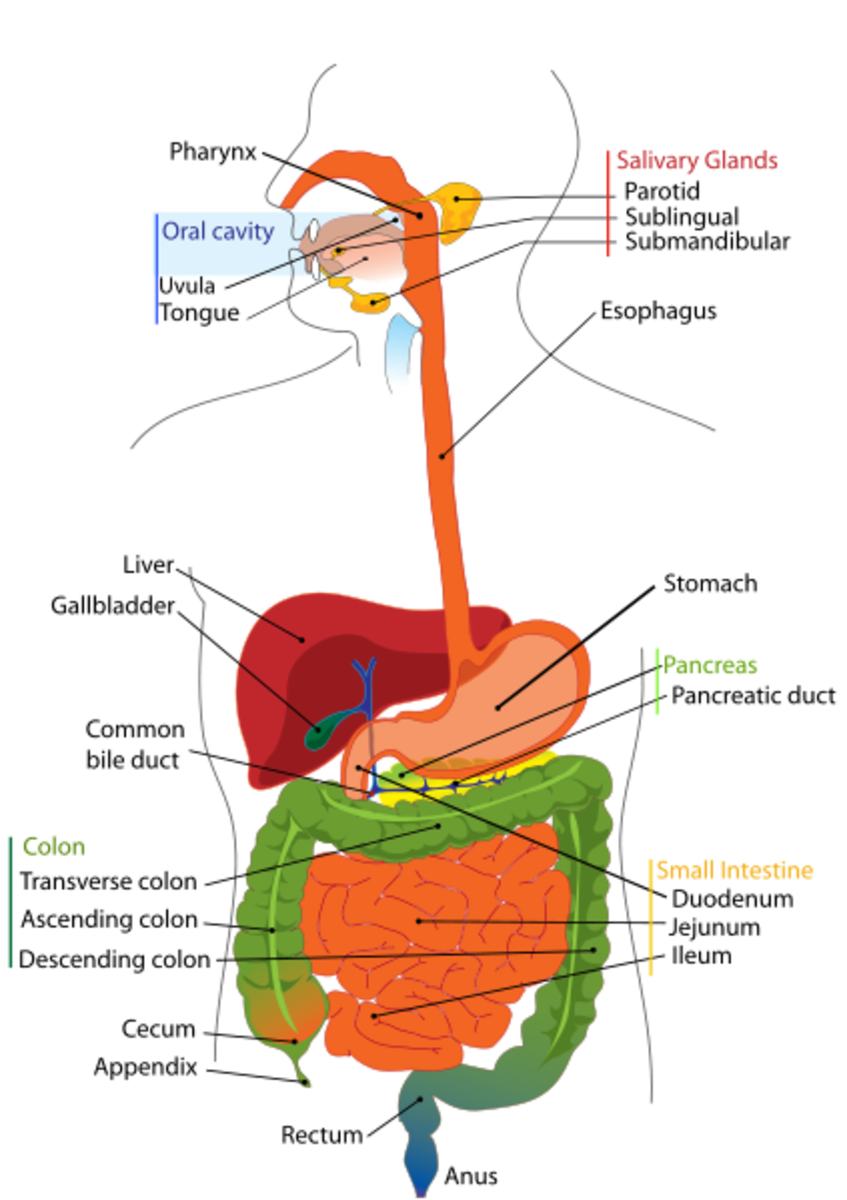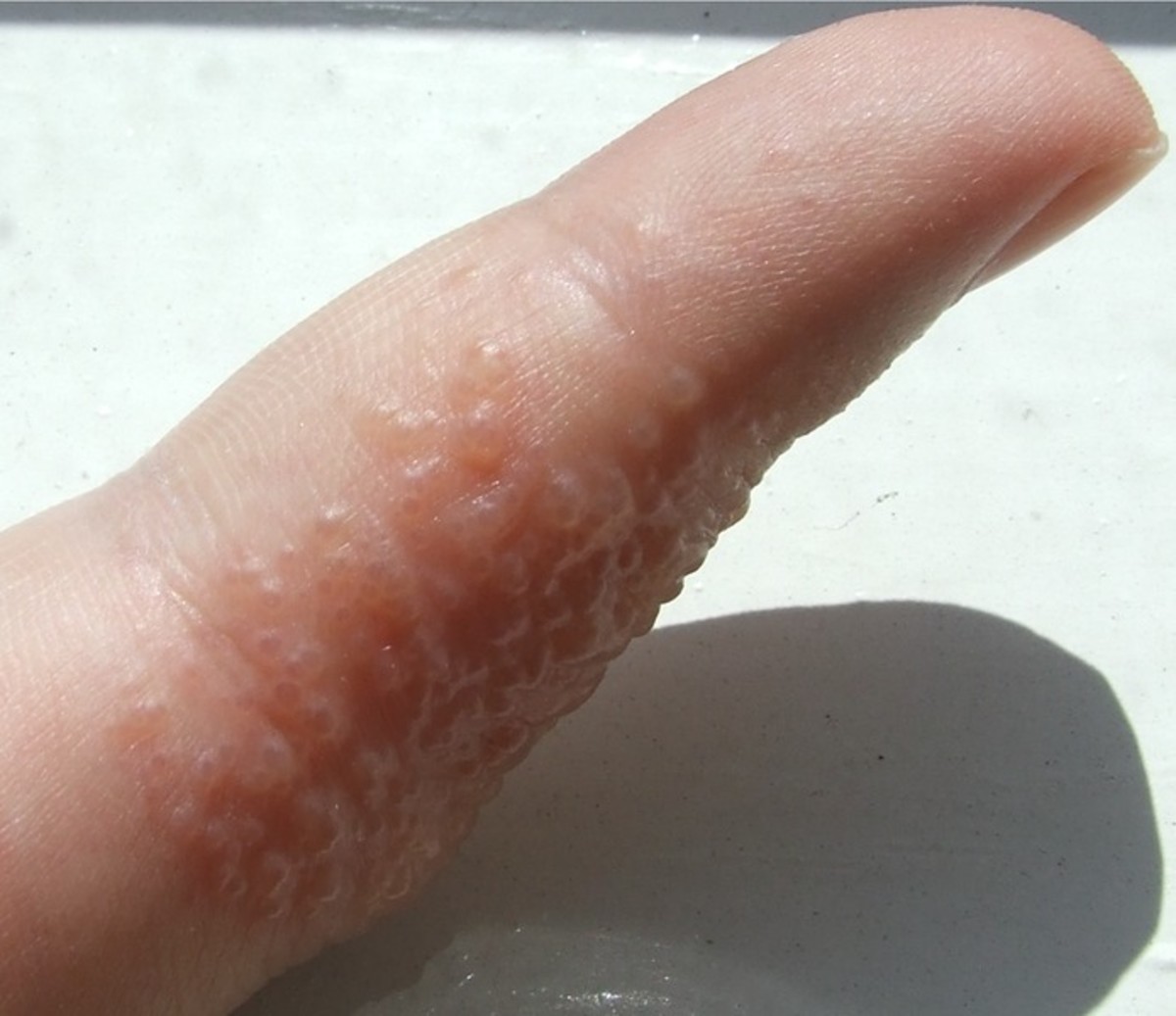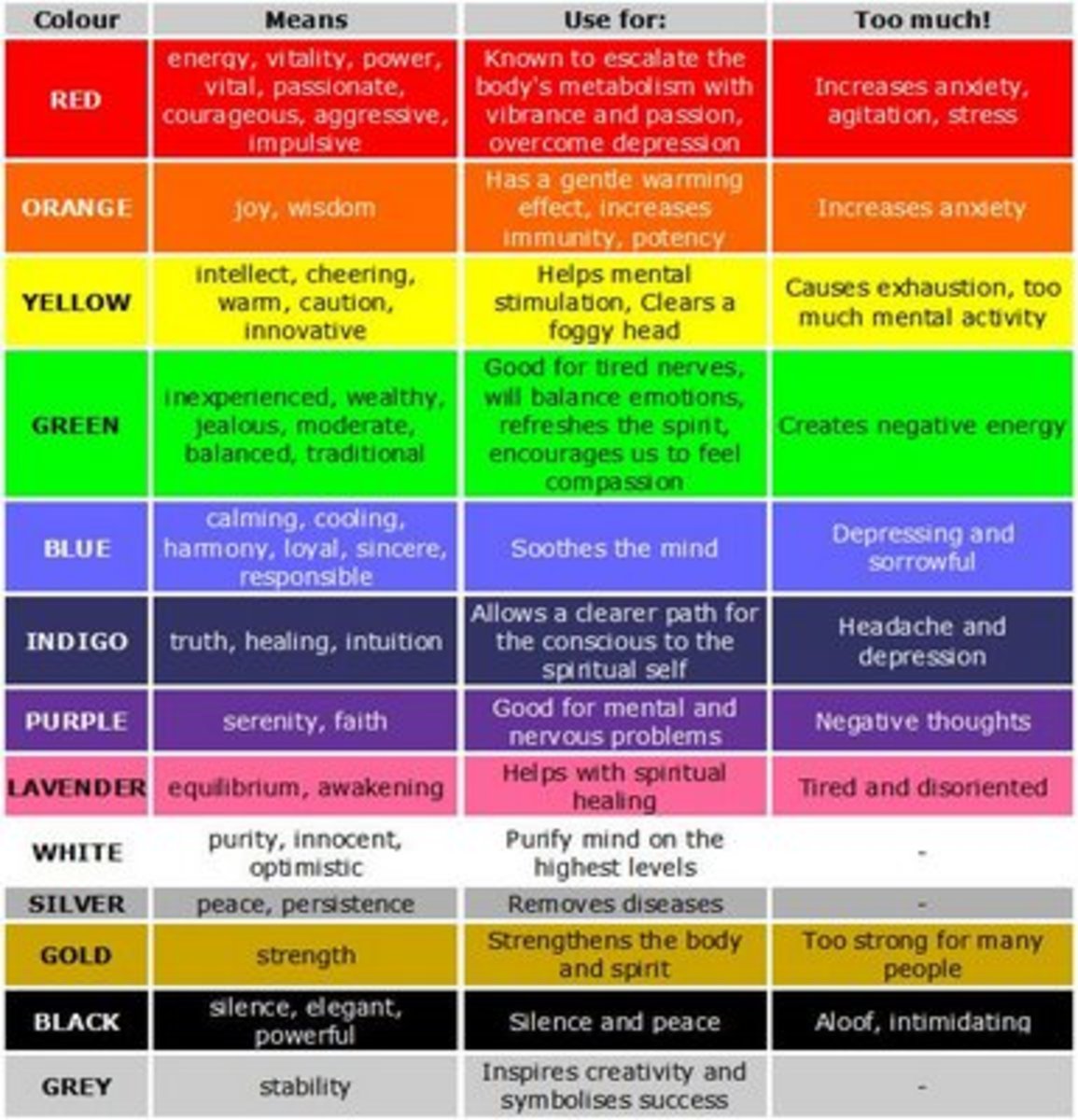Leaky Gut Syndrome - A Natural Approach
Human Gastrointestinal Tract
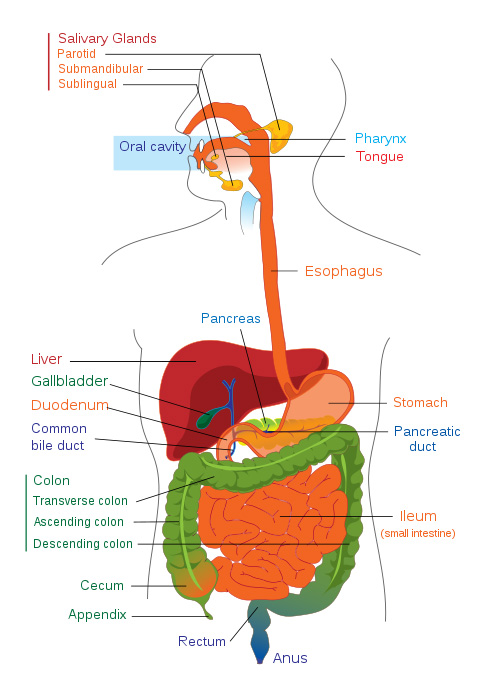
Discussion of Leaky Gut Syndrome
Leaky gut syndrome is a catch-all term for a situation in which the walls of the intestines, more specifically the small intestine, are more porous than normal and less efficient at keeping out things that should not be in the bloodstream. This in turn potentially causes any number of better-recognised medical problems that have a disturbed immune system as part of their mechanism. A good example of this is rheumatoid arthritis and the constellation of other problems often associated with it.
It ought to be noted that all the symptoms normally associated with relatively mild GI tract problems can also be caused by more serious problems such as cancer. In addition, most types of ulceration in the GI tract have at least the possibility of catastrophic effects if untreated. For this reason, if you have chronic gastrointestinal problems then you should see a professional. The same applies to acute, serious problems such as severe gastro-enteritis; it is not entirely unknown for people, even in the developed world, to die of diarrhoea especially if they are already in poor health.
The gastro-intestinal (GI) tract is approximately 5 metres long, from mouth to anus, in a healthy adult human. It ought to be noted that the contents of the GI tract are actually outside the body proper. The entire GI tract is lined with mucous membrane, and the cells comprising the GI tract are very frequently replaced; some parts of it have a lifespan in use of six days or less. This is because the GI tract lining, particularly the lining of the stomach and small intestine, are exposed to a number of physical and chemical assaults. Some types of fibre are quite abrasive to the GI lining, as are the small amounts of grit often consumed when eating vegetables and small particles of bone often consumed if eating meat or fish. The chemical assaults are derived from the food itself (quite a number of foods including tomatoes contain irritant toxins in small quantities, and spicy food contains quite a few irritants) and also from the digestive process; stomach acid is very corrosive indeed and the pancreatic juices and bile are quite strongly alkaline. Some commonly used food additives can also cause damage and/or inflammation of the gastro-intestinal tract wall.
In some cases, the gastrointestinal tract lining reacts abnormally to normal components of food that are usually not a problem. Gluten intolerance and the more serious version of gluten intolerance called celiac syndrome are examples of this.
Naturally, another chemical assault is from the digestive enzymes necessary to break down to make it usable to the body; the body’s own tissues are not immune to them. It is possible to demonstrate this to yourself. It so happens that pineapples contain bromelain, a protein-digesting enzyme; the tingling felt when you eat fresh, raw pineapple is caused by these enzymes attacking the lining of the mouth. Similar, stronger enzymes are found in pancreatic juice. Also, anyone who has ever suffered from heartburn will know that stomach acid is highly irritating to tissue without the stomach lining’s protection. (Heartburn actually has nothing to do with the heart; presumably, it got that name because the lower end of the oesophagus and the heart are in close proximity.)
Lastly, various fungi and pathogenic bacteria found in everyone’s intestines create their own toxins, some quite potent. A particularly nasty one, and one that is quite commonly a problem, is the fungus Candida albicans.
A healthy GI tract lining protects itself against all these assaults in several ways. For example, the stomach lining protects itself by secreting large quantities of specialised mucus; various agents including the bacterium Helicobacter pylori and non-steroidal anti-inflammatory drugs (NSAIDs) can disrupt this process. However, a major part of the way that the gut lining protects itself is simply by replacing itself as fast as it is being destroyed. This process can be impaired or disrupted in various ways, notably including lack of certain nutrients.
The lack of nutrients can occur in three ways; lack of the nutrients in food in the first place, poor digestion, and poor conversion of nutrients in the liver. (All the nutrients coming into the body from the digestive tract go through the liver via a specialised blood vessel called the hepatic portal vein.) Nutrient conversion in the liver can be impaired by damage caused by infections such as various forms of hepatitis, and also by damage from various chemicals. The most common liver-damaging agents are probably alcohol and paracetamol (acetaminophen).
Natural Therapies for a Leaky Gut
As already mentioned, it is necessary to eliminate the possibility of such serious problems as various GI tract cancers first. That dealt with:
Diet
The usual remarks about natural therapy apply here; eat as much of your food as possible as little processed as possible, and eat organic if possible and practical. Try to eliminate processed food with few nutrients and lots of additives, as far as possible.
However, an addition to this usual advice is necessary. To deal with gut inflammation and the associated problems, it is necessary to eliminate as far as possible any foods known to make the problem worse. This can be difficult to arrange, because you may not necessarily know what foods are worsening your problems. One way of dealing with this problem is to keep a “food and drink diary” and a similar diary of your symptoms. Please note that it can take several hours, or even a day or two, between ingestion of a particular food and the problems arising. However, comparing the two records will often be illuminating.
While finding out what your problem foods actually are, however, it may be worthwhile to eliminate the common culprits. These are cows’ dairy products, tomatoes, citrus fruits and wheat-based products. Alcohol and caffeine often cause worsening of symptoms, too; but dropping caffeine from your diet too quickly can cause its own set of problems if you consume a lot of it. Therefore, caffeine withdrawal should be gradual. One possible way of arranging this is to make your coffee half-and-half standard and decaffeinated.
Eating little and often, rather than a small number of large meals, can often help.
Digestive Enzymes
Since poor digestion is often a large part of the problem , it can often help to take a combination of the various types of digestive enzymes (protein-digesting, starch-digesting and fat-digesting) with any sizeable meal. The issue of which meals need this assistance is largely a matter of experiment.
Nutritional Supplements
Vitamin A and zinc are useful for mucous membrane and skin condition. Vitamin C is needed for tissue building and healing everywhere. B vitamins are needed to create digestive enzymes and to process your food into the compounds that the body actually uses, as well as to get energy out of your food. To a large extent, all these can probably be obtained by taking a high-strength, comprehensive multivitamin/mineral formula; some people may need 1000mg of vitamin C in addition.
Glutamine and glucosamine may well help for the regeneration of mucous membranes including the gastro-intestinal tract lining. Amounts needed are usually about 5 grams of glutamine and 1000mg of glucosamine per day.
Herbal Aids
Various adaptogenic herbs can be used to help calm down an over-active immune system. The list is long, but includes ashwagandha, Rhodiola rosea, Siberian ginseng and the reishi mushroom. Boswellia extract is an anti-inflammatory herbal that, unlike chemical anti-inflammatories such as NSAIDs, helps with inflammation of the gastrointestinal tract lining.
Probiotics
One of the classes of chemical assaults on the intestinal tract lining is toxins created by pathogenic bacteria and fungi such as Candida albicans. Probiotics, which are cultures of “friendly bacteria”, help keep these under control. In addition, probiotic bacteria help with digestion (particularly of lactose, found in milk) and also create various compounds such as butyric acid which are necessary for optimum health of the intestinal lining.


